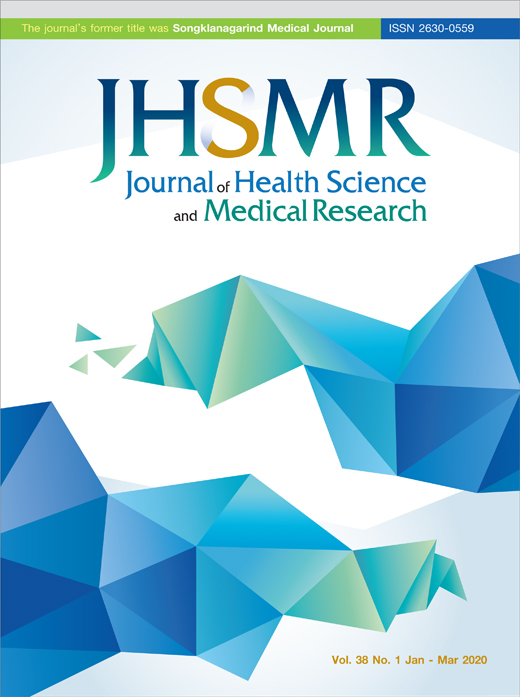Caring for Thai Traumatic Brain Injury Survivors in a Transitional Period: What Are the Barriers?
DOI:
https://doi.org/10.31584/jhsmr.202076Keywords:
caregiver, traumatic brain injury, transitional support programAbstract
Objective: We aimed to explore the situations and experiences of Thai traumatic brain injury (TBI) caregivers and nurses who care for TBI patients during their transition from hospital to home.
Material and Methods: A descriptive qualitative study was conducted in a tertiary hospital, in Songkhla province, Thailand. Five TBI family caregivers and nine nurses, who cared for TBI patients from admission to discharge, were selected for in-depth interviews and focus group discussions. Reviews of existing documents related to caring for someone during a transition period; such as: the caregiver’s booklet manual, nurse’s guideline, discharge education, and the service plan were also analyzed. Content analysis was used to explore caring for someone during a TBI situation, within the Thai context.
Results: The findings revealed six main barriers in the current care system for TBI caregivers and nurses. These included: (1) inadequate discharge teaching information, (2) less time in caregiver’s supervision and support, (3) lack of a comprehensive discharge plan, (4) lack of coordination and communication in follow-up care, (5) less confidence in providing care without support at home, and (6) poor availability of resources and time for consultation.
Conclusion: Caregivers require more information and supportive care in order to enhance their adaptation in taking care of TBI patients in the long term. Developing a tele-nursing based caregiver transitional support program among TBI caregivers is suggested.
References
2. Thai National Annual Report. Road accidents data center for road safety culture [homepage on the Internet]. Bangkok: Thai Road Accident Data Center for Road Safety Culture 2017 [cited 2018 Jun 16]. Available from: http://rvpreport.rvpeservice.com/viewrsc.aspx?report=0685&session=16
3. Hawley CA, Joseph S. Predictors of positive growth after traumatic brain injury: a longitudinal study. Brain Inj 2008;22:427–35.
4. Verhaeghe S, Defloor T, Grypdonck M. Stress and coping among families of patients with traumatic brain injury: a review of the literature. J Clin Nurs 2005;14:1004–12.
5. Khiewchaum R, Thosingha O, Chayaput P, Utriyaprasit K. Coping with traumatic brain injury using the preparation program among caregivers of patients in the intensive care unit. Siriraj Med J 2011;63:128-31.
6. Hyder AA, Wunderlich CA, Puvanachandra P, Gururaj G, Kobusingye OC. The impact of traumatic brain injuries: a global perspective. Neuro Rehabilitation 2007;22:341-53.
7. Lippert-Gruner M, Kuchta J, Hellmich M, Klug N. Neurobehavioral deficits after traumatic brain injury. Brain Inj 2006;20:569-74.
8. Ta-ue I, Utriyaprasit K, Chayaput P, Sitthinamsuwan B. The relationships between post concussion syndrome and functional status in patients with mild traumatic brain injury. Thai J Nurs Res 2012;25:39-53.
9. Utriyaprasit K, Bootcheewan S, Chayaput P, Thosingha O. The relationship between social support to caregiver and patient’s disability from traumatic brain injury. Siriraj Med J 2012;64:188-92.
10. Degeneffe CE, Chan F, Dunlap L, Man D, Sung C. Development and validation of the caregiver empowerment scale: a resource for working with FCs of persons with traumatic brain injuryRehabil Psychol 2011;56:243–50.
11. Family Caregiver Alliance. Traumatic brain injury: caregiving [homepage on the Internet]. San Francisco: Family Caregiver Alliance 2017 [cited 2018 Jun 15]. Available from: https://www. caregiver.org/traumatic-brain-injury
12. Backhaus S, Ibarra S. Brain injury coping skills: a support and education program for adults with brain injury and their caregivers. North Carolina: Lash & Associates; 2012.
13. Lefebvre H, Levert MJ. The close relatives of people who have had a traumatic brain injury and their special needs. Brain Inj 2012;26:1084–97.
14. Chen J, Davis LS, Davis KG, Pan WP, Daraiseh NM. Psychological and behavioural response patterns at work among hospital nurses. J Nurs Manag 2010;19:57–68.
15. Songwathana P, Sae-sia W, Kitrungrote L, Manoonya B. Development of a trauma-based continuing care model for enhancing care outcomes in social unrest area: a case study. J Nurs Car 2014;3:204.
16. Morse JM, Field PA. Qualitative research methods for health professionals. 2nd ed. California: Sage; 1995.
17. Cavanagh S. Content analysis: concepts, methods and applications. Nurse Res 1997;4:5–16.
18. Lincoln YS, Guba EG. Naturalistic inquiry. California: Sage; 1985.
19. Munhall PL. Nursing research a qualitative perspective. 4th ed. Boston: Jones & Bartlett; 2007.
20. Sandelowski M. The problem of rigor in qualitative research. Adv Nurs Sci 1986;8:27-37.
21. Siddiqui S, Sheikh F, Kamal R. What families want-an assessment of family expectations. Int Arch Med 2011;4:233-9.
22. Vance T. Caring and the professional practice of nursing. Am J Nurs 2007;13:59-61.
23. Reed RN, Messler EC, Coombs TE, Quevillon RP. Social media use and the acceptability of telepsychological services in rural populations. Rural Ment Health 2014;38:2-8.
24. Brownlee K, Graham JR, Doucette E, Hotson N, Halverson G. Have communication technologies influenced rural social work practice? Br J Soc Work 2010;40:622–37.
25. Cox VCM, Schepers VPM, Ketelaar M, van Heugten CM, Visser-Meily JMA. Evaluating the CARE4Carer Blended Care intervention for partners of patients with acquired brain injury: Protocol for a randomized controlled trial. JMIR Res Protoc 2018;7:e60.
26. Tran V, Lam MK, Amon KL, Brunner M, Hines M, Penman M, et al. Interdisciplinary eHealth for the care of people living with traumatic brain injury: a systematic review. Brain Inj 2017;31:1701-10.
























